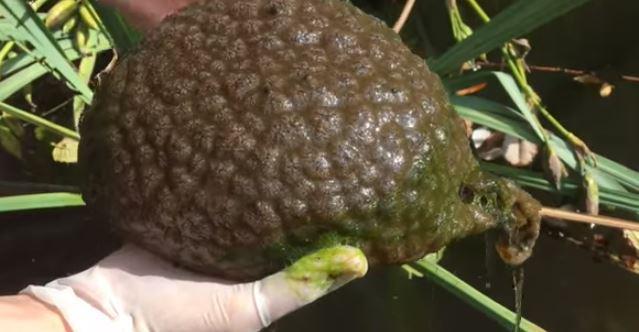Terrifying blob creature that looks like a BRAIN discovered in a spooky lake called ‘The Lost Lagoon’
By Jasper Hamill
A DISGUSTING blob creature that looks like a BRAIN has been discovered in a lake called The Lost Lagoon.
The horrible beastie is a nasty brown colour and is said to feel squishy but firm to the touch, a bit like jelly.
elina Starnes from the Stanley Park Ecology Society pulled one of the specimens out of the Lost Lagoon in Stanley Park in Vancouver, Canada.
In the video above, the organism can be seen jiggling and pulsating as it's dragged from the water.
The blob is called a bryozoan and is actually made up of tiny microscopic organisms called zooids, which can multiply without needing to have sex.
They are known to live further south in areas east of the Mississippi River, but this is the first time they have spotted in such a northerly area.
It's believed they may be thriving across North America due to climate change.
"With warming climate, they might migrate somewhere farther north," Ian Walker, a biology professor at the University of British Columbia, told National Geographic.
Read More: https://www.thesun.co.uk/tech/4370153/terrifying-blob-creature-that-looks-like-a-brain-discovered-in-a-spooky-lake-called-the-lost-lagoon/
A DISGUSTING blob creature that looks like a BRAIN has been discovered in a lake called The Lost Lagoon.
The horrible beastie is a nasty brown colour and is said to feel squishy but firm to the touch, a bit like jelly.
elina Starnes from the Stanley Park Ecology Society pulled one of the specimens out of the Lost Lagoon in Stanley Park in Vancouver, Canada.
In the video above, the organism can be seen jiggling and pulsating as it's dragged from the water.
The blob is called a bryozoan and is actually made up of tiny microscopic organisms called zooids, which can multiply without needing to have sex.
They are known to live further south in areas east of the Mississippi River, but this is the first time they have spotted in such a northerly area.
It's believed they may be thriving across North America due to climate change.
"With warming climate, they might migrate somewhere farther north," Ian Walker, a biology professor at the University of British Columbia, told National Geographic.
Read More: https://www.thesun.co.uk/tech/4370153/terrifying-blob-creature-that-looks-like-a-brain-discovered-in-a-spooky-lake-called-the-lost-lagoon/
HTML Comment Box is loading comments...

